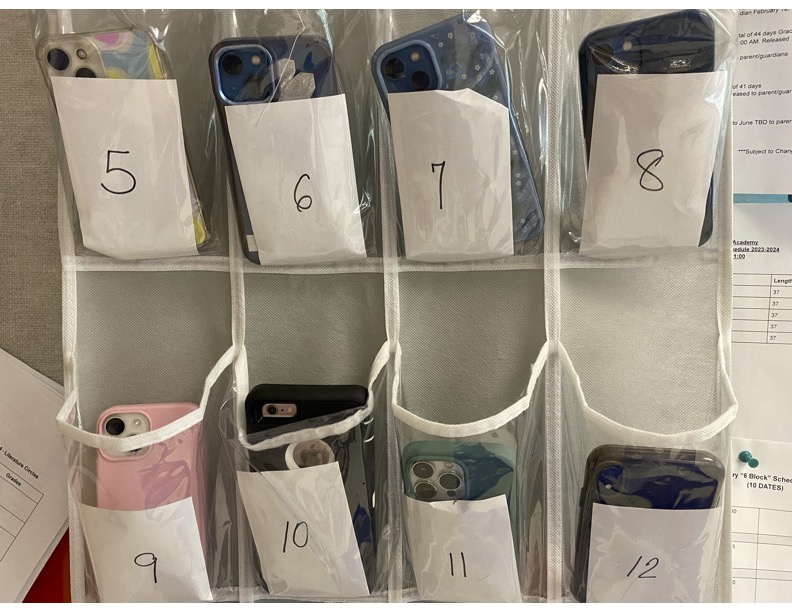It is no secret that cell phones and social media have made a large impact on the minds of teenagers and adults alike. Many can use up hours of their days mindlessly scrolling through apps or talking to their friends and it has become a regular activity for many. But when it comes to restricting screen time, how far is too far?
Recently, Westford Academy ran a trial on restricting cell phone usage from Monday, May 20 to Friday, May 24 that has sparked both negative and positive conversations schoolwide.
This experiment was called “no phone week” and the limitations on cell phone usage increased as the school week progressed. On Monday and Tuesday, students were required to keep their phones in their bags or in cell phone caddies during class. Wednesday had the same rules but added that cell phones could not be used in the hallways. Finally, on Thursday and Friday, cell phone usage was prohibited completely during school hours, including during classes, passing periods, and even lunch.
Based on the experience of no phone week, we believe that cell phones should only be restricted in class and not in the hallways or cafeteria. Along with this, while restricting phone use is completely acceptable, completely prohibiting it is not.
According to administration, the goal of this week was not to upset students and cause an inconvenience, but to improve communication among them and eliminate distractions.
The biggest annoyance observed among students was the restricted use of phones during lunch and in the hallways. Out of a nearly 6 ½ hour school day, lunch is the one period that students have to enjoy a break from schoolwork. While the school claims to be promoting social interactions, many modern social interactions involve phones, whether it be texting a friend or sharing content on a phone with peers during lunch time.
Furthermore, there are many students who struggle to find friends to sit with during their lunch, and using their phone acts as a safety net for them so that they don’t appear awkward while either sitting alone or with another group of individuals. If sitting with others, some students may also find themselves being left out of conversations that other students may be having. Using their phone gives them something to divert their attention to so that they aren’t awkwardly sitting off to the side while people they don’t know discuss an unfamiliar topic.
Social anxiety is another problem that many students face. 1 out of 3 adolescents ages 13-18 have been diagnosed with social anxiety disorders that prevent them from socializing with others in person. Using a phone allows them to either communicate over social media apps, such as Snapchat or iMessages, or even just serve as a distraction in largely populated areas such as the hallways or cafeteria.
While some may argue that phones can help students come out of their shell and reduce anxiety, it is apparent that our future is technology. Rather than eliminate it, we should instead move towards integrating it into our lives seamlessly. By doing this rather than eliminating it completely, it can work to regulate anxiety and prepare many for the future ahead of them.
Moreover, for some students, this new rule will not have a significant impact. Many are used to not having their phone with them during classes as some teachers require phones to be placed in phone caddies or inside of bags. Due to this, a strict rule revolving around phones is not very necessary. Unless the teacher allows it in that moment, students do not typically use their phones during class anyways. Creating a new rule around it only creates unnecessary tension.
We are not oblivious to the fact that phones can be a large distraction and cause students to procrastinate their work in class or not listen while the teacher is talking. According to the National Library of Medicine, 68% of students reported that the most common external distraction in class is ringing and buzzing phones and 21% of students end up being extremely distracted from it.
While it is understable for teachers to not want phones in classrooms as it is a proven distraction, when you bring this situation out to the lunchroom or hallways, it does not have a significant enough impact on students’ focus to restrain phone use during these times. Whether it be a five minute break in between classes or a longer one at a cafeteria table, these are some of the only times that students can relax and gather themselves for a moment during what can be a very stressful school day for many.
Outside of the classroom, oftentimes students will have to coordinate with parents about how they are getting home. Even more extreme than this, school causes anxiety for many students and sometimes the only thing that will calm them down is a reassuring text from a close friend or a parent. Sometimes the distraction is necessary for the mental health of the student.
Not only that, but when it comes to the hallway and cafeteria rule, it is an unreasonable expectation as students have multiple tools and apps they are accustomed to using on their phones. Asking them to make a complete transition to not using these at all does not consider their perspective.
Some may argue that if students need to coordinate rides or are dealing with anxiety or another mental struggle, they should simply ask their teachers to use their phones at certain moments. The problem with this occurs when students are fearful their teachers may say no. For many, it can be stressful to ask teachers for certain favors, and if one is already dealing with anxiety or stressed about their ride home, the last thing students want to deal with is fear of rejection or embarrassment in front of their classmates.
The goal of phone week was to eliminate distractions, and something like this could completely disrupt the class. This could involve the student potentially stopping the lesson if the situation needed to use the phone is urgent, and depending on the situation or how the strict the teacher is about phone usage, it could cut into a significant amount of class time. If this happens to be the day before an important test, it could mean taking away crucial review time. This could also take away from the individual student’s learning time if the teacher wants them to step out of the class while using their phones. All this distraction goes against why the trial was initiated in the first place.
Moreover, scheduling a ride may take more than five minutes between finding someone for a ride and confirming a time and place for pickup, so time in the hallways and during lunch is the only viable time to do so.
Society is constantly changing and evolving– older generations do not understand the dependency younger generations have built on phones just as the generations that came before them did not understand many of their habits. The truth of the situation is that phones are normalized in society and many depend on the benefit of immediate communication. Revoking something that has been the standard for most of our lives is more obstructive to daily life than it is helpful to communication.
It is evident that students are not going to let this phone policy pass without a fight. The best thing the adults in our lives can do is try to understand this from our perspective; they can make sure students feel the school is a safe space for everyone. Although phones can be considered a distraction in class, aside from learning time, they are valuable tools for students to utilize and they should be normalized, not excluded from day-to-day life.















Anonymous • May 28, 2024 at 8:48 pm
I agree with a lot of points made but I also believe that the school needs to be able to make clear the punishment for repeat offenders. It needs to be more than just taking their phone for the class period or day. Being on your phone in the middle of class is very disrespectful and I believe that many teachers don’t know how to punish them correctly without the rule in place telling them clearly the guidelines.